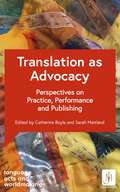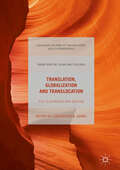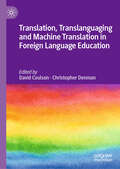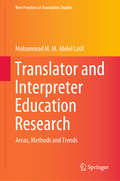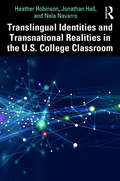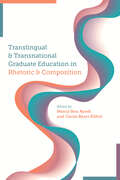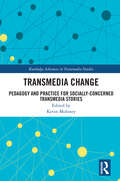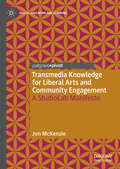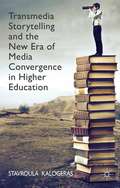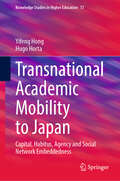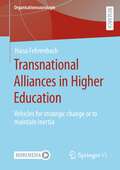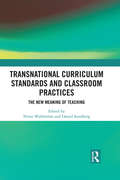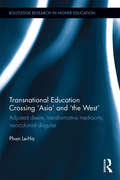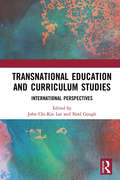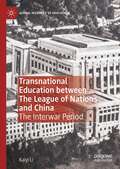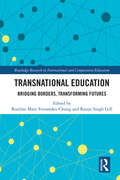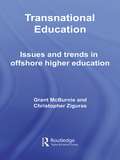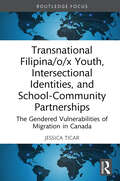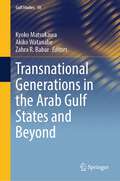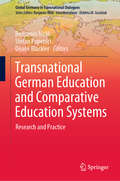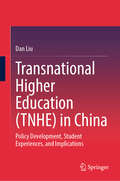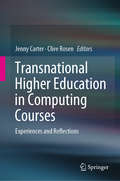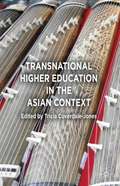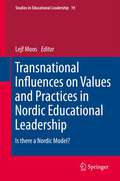- Table View
- List View
Translation as Advocacy: Perspectives on Practice, Performance and Publishing (Language Acts and Worldmaking)
by VariousWhat does it mean to advocate - in translation, for translation, through translation? What does advocacy look like, for those who do the translating or for those whose work is translated? To what extent is translation itself a form of advocacy? These 'what' questions are the driving force behind this collection.Translation as Advocacy highlights the innovative ways in which translator-academics in seven different fields discuss their practice in relation to their understanding of advocacy. The book aims to encourage people to think about translators as active agents bringing new work into the receiving culture, advocating for the writers they translate, for ideas, for practices. As such, the book asserts that the act of translation is a mode of cultural production and a political intervention through which the translator, as advocate, claims a significant position in intercultural dialogue.Featuring seven interrelated chapters, the book covers themes of judgement, spaces for translation, classroom practice, collaboration, intercultural position, textuality, and voice. Each chapter explores the specific demands of different types of translation work, the specific role of each stage of the process and what advocacy means at each of these stages, for example: choosing what is translated; mediating between author and receiving culture; pitching to publishers; social interactions; framing the translation for different audiences; teaching; creating new canons; gatekeepers and prizes; dissemination; marketing and reception. This book repositions the role of the translator-academic as an activist who uses their knowledge and understanding to bring agency to the complex processes of understanding across time and space. Moving critically through the different stages that the translator-academic occupies, using the spaces for research, performance and classroom teaching as springboards for active engagement with the key preoccupations of our times, this book will highlight translation as advocacy for students, educators, audiences for translation and the translation industry.Like all the volumes in the Language Acts and Worldmaking series, the overall aim is two-fold: to challenge widely-held views about language learning as a neutral instrument of globalisation and to innovate and transform language research, teaching and learning, together with Modern Languages as an academic discipline, by foregrounding its unique form of cognition and critical engagement.Specific aims are to:· propose new ways of bridging the gaps between those who teach and research languages and those who learn and use them in everyday contexts from the professional to the personal· put research into the hands of wider audiences· share a philosophy, policy and practice of language teaching and learning which turns research into action· provide the research, experience and data to enable informed debates on current issues and attitudes in language learning, teaching and research· share knowledge across and within all levels and experiences of language learning and teaching· showcase exciting new work that derives from different types of community activity and is of practical relevance to its audiences· disseminate new research in languages that engages with diverse communities of language practitioners.
Translation as Advocacy: Perspectives on Practice, Performance and Publishing (Language Acts and Worldmaking)
by VariousWhat does it mean to advocate - in translation, for translation, through translation? What does advocacy look like, for those who do the translating or for those whose work is translated? To what extent is translation itself a form of advocacy? These 'what' questions are the driving force behind this collection.Translation as Advocacy highlights the innovative ways in which translator-academics in seven different fields discuss their practice in relation to their understanding of advocacy. The book aims to encourage people to think about translators as active agents bringing new work into the receiving culture, advocating for the writers they translate, for ideas, for practices. As such, the book asserts that the act of translation is a mode of cultural production and a political intervention through which the translator, as advocate, claims a significant position in intercultural dialogue.Featuring seven interrelated chapters, the book covers themes of judgement, spaces for translation, classroom practice, collaboration, intercultural position, textuality, and voice. Each chapter explores the specific demands of different types of translation work, the specific role of each stage of the process and what advocacy means at each of these stages, for example: choosing what is translated; mediating between author and receiving culture; pitching to publishers; social interactions; framing the translation for different audiences; teaching; creating new canons; gatekeepers and prizes; dissemination; marketing and reception. This book repositions the role of the translator-academic as an activist who uses their knowledge and understanding to bring agency to the complex processes of understanding across time and space. Moving critically through the different stages that the translator-academic occupies, using the spaces for research, performance and classroom teaching as springboards for active engagement with the key preoccupations of our times, this book will highlight translation as advocacy for students, educators, audiences for translation and the translation industry.Like all the volumes in the Language Acts and Worldmaking series, the overall aim is two-fold: to challenge widely-held views about language learning as a neutral instrument of globalisation and to innovate and transform language research, teaching and learning, together with Modern Languages as an academic discipline, by foregrounding its unique form of cognition and critical engagement.Specific aims are to:· propose new ways of bridging the gaps between those who teach and research languages and those who learn and use them in everyday contexts from the professional to the personal· put research into the hands of wider audiences· share a philosophy, policy and practice of language teaching and learning which turns research into action· provide the research, experience and data to enable informed debates on current issues and attitudes in language learning, teaching and research· share knowledge across and within all levels and experiences of language learning and teaching· showcase exciting new work that derives from different types of community activity and is of practical relevance to its audiences· disseminate new research in languages that engages with diverse communities of language practitioners.
Translation, Globalization and Translocation
by Concepción B. GodevThis book examines the spaces where translation and globalization intersect, whether they be classrooms, communities, or cultural texts. It foregrounds the connections between cultural analysis, literary critique, pedagogy and practice, uniting the disparate fields that operate within translation studies. In doing so, it offers fresh perspectives that will encourage the reader to reappraise translation studies as a field, reaffirming the directions that the subject has taken over the last twenty years. Offering a comprehensive analysis of the links between translation and globalization, this ambitious edited collection will appeal to students and scholars who work in any area of translation studies.
Translation, Translanguaging and Machine Translation in Foreign Language Education
by Christopher Denman David CoulsonThis book focuses on a wide range of topics about the current and emergent roles and uses of translation and translanguaging in the teaching and learning of foreign languages. This is an area that has been gaining increasing momentum in recent years, with traditional understandings and practices in the uses of translation for language instruction being challenged and, in many cases, disrupted, by the rapid development of machine translation apps such as DeepL and the ChatGPT translator. The improving quality and widespread deployment of such technologies are causing instructors and students around the world to reconsider not only their pedagogic approaches to the use of translation in the classroom, but also what effective instruction looks like. The contributing authors provide an up-to-date and detailed view of this area. This includes voices from researchers and professional educators from around the world. As the book’s focus, they examine the current and projected future roles of translation in foreign language learning and teaching, within which a wide range of topics are explored. This book will be of interest to researchers, scholars and teachers in foreign and second language education (EFL, ESL), translation studies, applied linguistics, multilingualism and education.
Translator and Interpreter Education Research: Areas, Methods and Trends (New Frontiers in Translation Studies)
by Muhammad M. Abdel LatifThis book provides a detailed introduction and guide to researching translator and interpreter education. Providing an overview of the main research topics, trends and methods, the book covers the following six areas: training effectiveness, learning and teaching practices, assessment, translation and interpreting processes, translated and interpreted texts, and professionals’ experiences and roles. The book focuses on explaining the issues and topics researched in each area, and showing how they have been researched. As the first book to provide a comprehensive overview of translator and interpreter education research, it has important implications to developing its areas at the theoretical and practical levels. In addition, it offers an invaluable guide for those interested in researching translator and interpreter education areas, and in educating translators and interpreters.
Translingual Identities and Transnational Realities in the U.S. College Classroom
by Jonathan Hall Heather Robinson Nela NavarroExploring the roles of students’ pluralistic linguistic and transnational identities at the university level, this book offers a novel approach to translanguaging by highlighting students’ perspectives, voices, and agency as integral to the subject. Providing an original reconsideration of the impact of translanguaging, this book examines both transnationality and translinguality as ubiquitous phenomena that affect students’ lives. Demonstrating that students are the experts of their own language practices, experiences, and identities, the authors argue that a proactive translingual pedagogy is more than an openness to students’ spontaneous language variations. Rather, this proactive approach requires students and instructors to think about students’ holistic communicative repertoire, and how it relates to their writing. Robinson, Hall, and Navarro address students’ complex negotiations and performative responses to the linguistic identities imposed upon them because of their skin color, educational background, perceived geographical origin, immigration status, and the many other cues used to "minoritize" them. Drawing on multiple disciplinary discourses of language and identity, and considering the translingual practices and transnational experiences of both U.S. resident and international students, this volume provides a nuanced analysis of students’ own perspectives and self-examinations of their complex identities. By introducing and addressing the voices and self-reflections of undergraduate and graduate students, the authors shine a light on translingual and transnational identities and positionalities in order to promote and implement inclusive and effective pedagogies. This book offers a unique yet essential perspective on translinguality and transnationality, and is relevant to instructors in writing and language classrooms; to administrators of writing programs and international student support programs; and to graduate students and scholars in language education, second language writing, applied linguistics, and literacy studies.
Translingual and Transnational Graduate Education in Rhetoric and Composition
by Nancy Bou Ayash Carrie Byars KilfoilTranslingual and Transnational Graduate Education in Rhetoric and Composition investigates the implications of composition studies’ changing terminological and ideological landscape around language and nation for the professionalization of future university writing teacher-scholars. As the collection editors argue, incorporating translingual and transnational theories into graduate pedagogy and curricular structures is necessary if they are to shape professional practices in rhetoric and composition long term. Contributors to the collection articulate the need for translingual and transnational sensibilities in rhetoric and composition graduate programs in light of the material conditions of graduate students’ lives and labor. They further present pathways for rethinking the design of graduate-level coursework, foreign language learning policies and labor, mentoring practices, writing teacher and writing center tutor training, and other professionalization initiatives. Offering a range of conceptually and empirically driven pieces, the collection brings together the voices and lived experiences of graduate students, faculty advisors, and administrators involved in the constant, necessary reworking of rhetoric and composition graduate education in a variety of institutional locales. Translingual and Transnational Graduate Education in Rhetoric and Composition provides inspiration for graduate programs working to enact well-grounded curricular and pedagogical changes to counter the long-standing effects of the dominant racist and monolingualist ideologies in higher education generally, and rhetoric and composition studies specifically. Contributors: Lucía Durá, Patricia Flores, Joe Franklin, Moisés Garcia-Renteria, Bruce Horner, Aimee Jones, Corina Lerma, Kate Mangelsdorf, Brice Nordquist, Madelyn Pawlowski, Christine Tardy, Amy Wan, Alex Way, Anselma Widha Prihandita, Joe Wilson, Xiaoye You, Emily Yuko Cousins, Michelle Zaleski
Transmedia Change: Pedagogy and Practice for Socially-Concerned Transmedia Stories (Routledge Advances in Transmedia Studies)
by Kevin MoloneyThis book examines and illustrates the use of design principles, design thinking, and other empathy research techniques in university and public settings, to plan and ethically target socially-concerned transmedia stories and evaluate their success through user experience testing methods. All media industries continue to adjust to a dispersed, diverse, and dilettante mediascape where reaching a large global audience may be easy but communicating with a decisive and engaged public is more difficult. This challenge is arguably toughest for communicators who work to engage a public with reality rather than escape. The chapters in this volume outline the pedagogy and practice of design, empathy research methods for story development, transmedia logics for socially-concerned stories, development of community engagement and the embrace of collective narrative, art and science research collaboration, the role of mixed and virtual reality in prosocial communication, ethical audience targeting, and user experience testing for storytelling campaigns. Each broad topic includes case examples and full case studies of each stage in production. Offering a detailed exploration of a fast-emerging area, this book will be of great relevance to researchers and university teachers of socially-concerned transmedia storytelling in fields such as journalism, documentary filmmaking, education, and activism.
Transmedia Knowledge for Liberal Arts and Community Engagement: A StudioLab Manifesto (Digital Education and Learning)
by Jon McKenzieThis book sets forth a pedagogy for renewing the liberal arts by combining critical thinking, media activism, and design thinking. Using the StudioLab approach, the author seeks to democratize the social and technical practices of digital culture just as nineteenth century education sought to democratize literacy. This production of transmedia knowledge—from texts and videos to comics and installations—moves students between seminar, studio, lab, and field activities. The book also wrestles with the figure of Plato and the very medium of knowledge to re-envision higher education in contemporary societies, issuing a call for community engagement as a form of collective thought-action.
Transmedia Storytelling And The New Era Of Media Convergence In Higher Education
by Stavroula KalogerasIn the age of media convergence, stories have morphed into new forms yet their core purpose remains the same, which is to pass on knowledge and information. This book argues that the inherent interactivity of the internet and the emotional engagement of story can lead to innovative pedagogies in media-rich environments.
Transnational Academic Mobility to Japan: Capital, Habitus, Agency and Social Network Embeddedness (Knowledge Studies in Higher Education #17)
by Hugo Horta Yifeng HongThis book addresses agency and habitus development of migrant academics in Japan and reveals the complexity of international academic mobility in East Asian contexts. It addresses differentiated transnational academic mobility routes and route-confined capitals and dispositions, the effect of stratified social networks and network embeddedness on international academic mobility, and the effect of unequal globalization and the asymmetrical internationalization of international academic mobility. The book highlights the roles of transnationally stretched social network development and network embeddedness along life trajectories, locating them as critical infrastructures of mobilities and identifying an array of individual social network building and maintenance strategies and principles. It illustrates how familial, educational, academic and social networks across borders facilitate and channel flows of capitals and resources vital for academic performance and upward academic mobility of migrated academics. It draws on a range of theoretical frameworks of Bourdieusian theory of sociology, transnationalism and qualitative social network analysis. The research is based on 26 case studies of migrant scholars in Japan, using narrative inquiry and qualitative social network analysis. The work provides multiple implications for practitioners, policy makers and researchers who seek answers to the sustainability of the internationalization of higher education in Asia Pacific and emerging higher education hubs.
Transnational Alliances in Higher Education: Vehicles for strategic change or to maintain inertia (Organisationssoziologie)
by Hana FehrenbachHana Fehrenbach’s book examines organizational level transnational strategic alliances. Through the perspectives of dynamic capabilities and neo-institutionalism, the study explores the interplay of rationales, pathways and benefits of transnational alliances over time of leading universities of technology (TU9) in Germany. Complex inter-connected dynamics at the macro (i.e. society), meso (i.e. organization) and micro-levels (i.e. individual) are examined in this qualitative study driven by a deductive approach. These interrelated dynamics are then reflected in a recursive process model called STANCE, which depicts how through these types of alliances, institutions of higher education position themselves in single or multiple organizational fields to gain (more) strategic and social fitness. The study is timely, considering the paucity of comprehensive and theoretically anchored research on this contemporary phenomenon, and the need for policy-makers and senior leadership to make evidence-based decisions.
Transnational Curriculum Standards and Classroom Practices: The New Meaning of Teaching
by Ninni Wahlström Daniel SundbergFocusing on the meaning of teaching, Transnational Curriculum Standards and Classroom Practices contributes to a deepened understanding of what it means to be a teacher in an institutional context ranked high on the policymakers’ agenda. While the policy literature emphasises efficiency in teaching, educational research demonstrates an awareness of the importance of alternative perspectives on what makes for successful teaching. This book critically examines the conditions and dimensions of teaching as framed in current policy discourse and situates school education in relation to wider societal issues. Based on a four-year research project financed by the Swedish Research Council and drawing on international policy discourse, as well as international research, the chapters in this book contribute to the knowledge of relations and influences between international educational reform movements, national curriculum reforms, and implications for teaching and learning practices at the classroom level. Offering results and reflections from comprehensive comparative classroom studies, the book makes a distinctive contribution to our knowledge of the implications of policy for teachers and students. This book should be essential reading for academics, researchers and postgraduate students interested in the relationship between the curriculum and teaching in a contemporary context, as well as those engaged in the study of education policy, curriculum theory, pedagogy and educational leadership. It should also be of great interest to policymakers and teachers.
Transnational Education Crossing 'Asia' and 'the West': Adjusted desire, transformative mediocrity and neo-colonial disguise (Routledge Research in Higher Education)
by Le-Ha PhanIn this book, Phan Le-Ha identifies and discusses four growing self-sustained/sustaining fundamental phenomena in transnational education (TNE), namely (1) the planned, evolving and transformative mediocrity behind the endorsement of English-medium education legitimized by the interactive Asia-the West relationship; (2) the strategic employment of the terms ‘Asia/Asian’ and ‘West/Western’ by all stakeholders in their perceptions and construction of choice, quality, rigour, reliability and attractiveness of programs, courses, and locations; (3) the adjusted desire for an imagined (and often misinformed) ‘West’ among various stakeholders of transnational education; and (4) the assigned and self-realized ownership of English by otherwise normally on-the-margin groups of speakers. A focus on how these phenomena impact questions of identity and desire in TNE is a running theme. The above phenomena are discussed against the backdrop of ‘the rise of Asia’ sentiment and how this sentiment has played out in interactions and relationships between ‘the West’ and ‘Asia’ and among Asian institutions and various entities. Phan Le-Ha’s examination of the identified phenomena in TNE has been informed by her multi-layered engagement with the dialectic of the Asia-the West relationship, her critical take on certain pro-Asia and decolonisation scholarship, and her interdisciplinary and multidisciplinary approach to theorise the field and the specific topic under scrutiny. Phan Le-Ha shows that the current Asia chooses (not necessarily by force but largely by will and often with an informed and well-articulated agency) to go with the idea of the West and often desires an affiliation with the West either directly or indirectly, something that is getting more intense in the context of globalization, regionalization, and commercialization of education. The rise of Asia has made the idea of the West even more looked-for in Asia. TNE in Asia, in many ways, is the transforming and dynamic transit point, a layover that facilitates entry into a wanted destination – the West and/or the idea of the West. The West and Asia need one another more than ever in the context of the internationalization and commercialization of higher education. What’s more, the West and Asia have hardly ever been mutually exclusive but have rather been in an eventful love-and-obsession relationship with each other. This is the very dialectic proposition that Phan Le Ha takes throughout this book while paying specific attention to transnational higher education in the greater Asian region including the Middle East, following her several research projects conducted in the region since 2005 to date. Transnational Education Crossing 'the West' and 'Asia' explores: • English, Internationalisation of Higher Education, and Identity: Increasing Academic Monolingualism and English-only Package • Transnational Education and Dream Realization: From the Philippines to Vietnam, From Afghanistan to Dubai, From Everywhere in Asia to Thailand • Desiring International /Transnational Education: Theorisation of Key Concepts and Next Steps from Here The book will be of interest to researchers in the field of transnational education, Asia education and education policy.
Transnational Education and Curriculum Studies: International Perspectives
by John Chi-Kin LeeIn recent years, there has been increasing attention placed on international and transnational aspects of school and higher education curricula, and the different research approaches and lenses through which these issues are studied. This edited volume explores diverse perspectives and discourses of curriculum studies contributed by scholars both within and outside the "majority world". In addition, it tackles both transnational cross-border endeavours involving national governments and policy measures, and the promises, challenges and failings of those formal relationships. The book consists of three sections. The first section provides an introduction and overviews of transnational education in connection with curriculum studies, schooling and higher education. The second section deals with transnational and international perspectives on curriculum studies, schooling and education. The final, third section highlights transnational and international perspectives on higher education. This timely volume tackles the questions often posed by curriculum scholars and educational researchers around the possibility of a transnational approach to curriculum studies and how (and if) a common set of means can transcend national boundaries and sensitivities. It looks at the common issues and problems across nations that international and transnational curriculum and educational research work could address. This volume will appeal to researchers and policy makers interested in transnational education and curriculum studies.
Transnational Education between The League of Nations and China: The Interwar Period (Global Histories of Education)
by Kaiyi LiThis volume examines transnational educational transfer between China and the League of Nations during the interwar period. By analysing the educational activities of the League of Nations with China, he book enriches the study of the history of the League of Nations by turning the focus to affairs that exceed the scope of traditional international relation and focusing on ways in which international organizations engaged in international educational endeavors. Adopting a transnational perspective, the book moves beyond conventional national-centered historiography, thus contributing to the understanding of how educational ideas, media, and policies circulate between different nations.
Transnational Education: Bridging Borders, Transforming Futures (Routledge Research in International and Comparative Education)
by Rozilini Mary Fernandez-Chung Ranjit Singh GillThis book explores the rapidly expanding world of cross-border education. As international student numbers have surged from 1.6 million in 2000 to over 6.4 million in 2022, transnational education (TNE) has become a transformative force in global higher education. This volume delves into how universities cross borders to deliver education, exploring models ranging from international branch campuses to digital learning platforms.Drawing on rich case studies from Asia, the Middle East, and beyond, the book examines four key dimensions of TNE: alignment with sustainable development goals, cross-border governance frameworks, regional cultural dynamics, and student experience. It offers a detailed analysis of established TNE markets like Malaysia and the Gulf states while uncovering developments in emerging hubs such as Sri Lanka and Vietnam. The contributors examine critical questions of quality assurance, cultural adaptation, and institutional partnerships that shape modern TNE. This book is an essential resource for policymakers, educators, and institutional leaders in an increasingly interconnected world. By offering practical strategies and forward-looking insights, it equips readers to navigate the complexities of TNE and leverage its potential to address pressing global challenges, from educational inequality to workforce development – a vital guide for shaping the future of international education.
Transnational Education: Issues and Trends in Offshore Higher Education
by Christopher Ziguras Grant McBurnieWhile the international mobility of students is a well-established feature of higher education, the international mobility of institutions and courses on a large scale is a more novel phenomenon. Transnational education is at the leading-edge of the most fundamental changes taking place in higher education today. Topics discussed in this new volume include: the extent and form of offshore activity the pedagogical and cultural controversies that have plagued transnational education the challenges it presents to governments, educators and HE managers how governments are developing forms of regulation to integrate cross-border programs and branch-campuses into their strategic planning for the sector the new opportunities for students and institutions. Transnational Education presents a global perspective on the development of international online education, partner-supported transnational programs and international branch campuses. It provides a comprehensive and analytical account of the active role some universities are playing on the international stage and offers valuable guidance on future trends in the sector.
Transnational Filipina/o/x Youth, Intersectional Identities, and School-Community Partnerships: The Gendered Vulnerabilities of Migration in Canada (Routledge Critical Studies in Gender and Sexuality in Education)
by Jessica TicarThis book provides an in-depth examination of how Filipina mothers, serving as migrant caregivers, and their children navigate the experiences of family separation and reunification through Canada’s Live-in/Caregiver Program (L/CP).It analyses how Filipina/o/x youth understand their political agency, the legacy of colonialism, and their sense of identity and belonging in urban schools through school-community partnerships. The work examines the global migration experiences of transnational Filipina/o/x youth and their mothers in nation-states such as Canada through the lens of the global domestic work industry. It connects the theoretical frameworks of critical and intersectional feminisms within a transnational context to the specificity of settler colonialism within Canada, a white settler nation-state. It underscores the pivotal role of school-community partnerships in facilitating the political agency of Filipina mothers and their children, and in shaping Filipina/o/x youths’ transnational identities through equitable educational policies and, ultimately, im/migration policies and practices. This book is a valuable addition to the discourse on global migration, transnational feminism, and critical race studies in education.The book primarily targets scholars, researchers, graduate students in the fields of Gender Studies, Education, Psychology, Mental Health, Immigration/Transnational Studies, and Asian Canadian Studies. It is particularly relevant for those with specialist knowledge in Gender and Immigration Studies, as well as Equity and Social Justice Education, which includes a focus on supporting the participation of racialized im/migrants in the school system.
Transnational Generations in the Arab Gulf States and Beyond (Gulf Studies #10)
by Zahra R. Babar Kyoko Matsukawa Akiko WatanabeThis book examines the recent migration phenomenon in the Arab Gulf states for work and residence. It sheds light on the transnationality of diverse groups of migrants from different generations, and unpacks how migrants’ multiple senses of belonging, orientations and adaptive strategies have shaped contemporary migration in the Gulf region. In turn, the analysis presented here shows how the Arab Gulf states’ citizenship and educational policies affect second-generation migrants in particular. Through a series of fine-grained ethnographic case studies, the authors demonstrate the ways in which these second-generation migrants construct their identities in relation to their putative ‘home’ country in the Gulf as well as their complex relationship to their parents’ countries of origin. This is what underpins the deeply transnational character of their lives, choices and notions of belonging. While migration scholars often situate these groups as ‘temporary’, this does not in fact capture the reality of temporariness for the migrants themselves, their children or their dependants. The result is a complex and ongoing construction of identity that shapes the way of life for millions of migrants. Relevant to scholars of migration and international studies, particularly focused on the Middle East, Transnational Generations in the Arab Gulf States and Beyond is also of interest to social scientists researching student mobility in higher education, intergenerational families, identity politics and globalisation.
Transnational German Education and Comparative Education Systems: Research and Practice (Global Germany in Transnational Dialogues)
by Benjamin Nickl Stefan Popenici Deane BlacklerThis book presents an in-depth look at the state of transnational education and comparative perspectives on education systems between Germany and other nation states. It explores how a transnational education identity in secondary and tertiary institutions has developed in the German and other national contexts and which lessons can be learned from current challenges and successes of education systems. It uses detailed case studies to promote critical rethinking of current educational practices in high schools and universities, specifically of race, gender, religion and learner ability in educational settings. It understands learning and teaching as an arena to discuss transnational education opportunities in the 21st century as an emerging or evolving discourse on contemporary forms of transnationalism.
Transnational Higher Education (TNHE) in China: Policy Development, Student Experiences, and Implications
by Dan LiuThis book provides an in-depth analysis of the motivations, experiences, and challenges that Chinese students face in transnational higher education (TNHE). It traces their educational journey-from their initial motivations for seeking TNHE to their graduate employment-while exploring the academic, social, and cultural dimensions of their experiences. Readers will gain a nuanced understanding of Chinese students&’ engagement with TNHE, both within China and at later stages abroad. The book offers valuable insights for educators, policymakers, and researchers, providing a strong foundation for addressing the challenges and opportunities associated with TNHE in China. Additionally, it serves as a key resource for those interested in enhancing Chinese students&’ perceptions of and experiences in TNHE programmes. Beyond practical implications, this book contributes to the theorisation of TNHE, teacher development, and research methodologies in the field.
Transnational Higher Education in Computing Courses: Experiences and Reflections
by Jenny Carter Clive RosenThere has been exponential growth in transnational education (TNE) in the last few years as UK universities have looked to expand their markets. Recipient countries have sought short cuts to developing their higher education provision which has proved a lucrative income stream for some universities. But overseas collaborations are not without risk. Recipient countries can be concerned with external influence over curricula, quality being diluted and higher education being infected by neo-imperialism. These concerns are not without foundation. There are risks for providers too. Reputations can be damaged if academic standards are compromised. Conflicts of interest can occur between quality of provision and the pot of gold on offer. Staff can view overseas collaborations as distracting from their research and commitment to home students. Computing is a particularly popular subject for TNE, but critical thinking, analysis, independent learning, and creativity can be compromised. Preventing plagiarism is difficult. Constant changes in technology result in constant curricula revision which causes severe problems for overseas collaborations. This book focuses on TNE in the computing domain. However cross-cultural issues challenge TNE management and administration whatever the subject area. If the ever present tensions are not continuously monitored they can quickly threaten the sustainability of the collaboration. This book identifies many of the threats and some of the solutions. The readership for this book is truly global. Any international development officer in higher education considering an overseas collaboration will benefit from this book. Any academic becoming engaged in, or already involved with a TNE partnership, either as provider or recipient, will gain information and insight into the practice and issues. Researchers in TNE will discover more lines of enquiry. Students considering a course with an overseas provider or in coming to the UK to study will be better prepared thereby enabling a more fulfilling and rewarding experience. Anyone who has an interest in TNE, whether at the senior executive level, operational level, delivering programmes or as a recipient of TNE should read this book. The wealth of experience gathered here will provoke questions, prompt debate and offer solutions. It has been written by people who know the issues, bear the scars and are happy to share their knowledge. It will greatly benefit future transnational collaborations.
Transnational Higher Education in the Asian Context
by Tricia Coverdale-JonesThis book offers new insights and perspectives on internationalization and trans-national higher education (TNHE) with contributions from three continents. These include the student experience in Malaysia, China, Japan and India as well as institutional perspectives and pedagogical implications of new research.
Transnational Influences on Values and Practices in Nordic Educational Leadership
by Lejf MoosThis book explores to what extent transnational influences change national/local values and practices in the Nordic educational systems. It provides country cases and thematic chapters that give nuanced insights into the influence of transnational agencies on national governance and discourses. It describes how national discourses and regulation influences school leadership values, culture and practice, in competition with traditional values. The transnational and global discourse on educational leadership is mostly formed according to Anglo-American thinking and tradition. Pivotal foundations of this discourse are strong hierarchical societies/class societies with liberal democracies, and clearly streamed education systems. The Nordic discourse, however, builds on a more equal society and flat hierarchies with participatory democracy, and on comprehensive schooling with strong local community roots. Leadership thinking and practices are formed by the culture and context they are part of: they are primarily shaped by the national/local values, traditions and practices, and only partially shaped by politics, discourses and literature. Due to the fact that a great deal of the literature that is being used in the Nordic contexts is of Anglo-American origin and many of the research projects have Anglo-American foundations, it is difficult to distinguish the sources for leadership thinking and practice. This book distinguishes the Nordic from the Anglo-American thinking and presents important findings and arguments for leadership practitioners inside as well as outside the Nordic countries.
